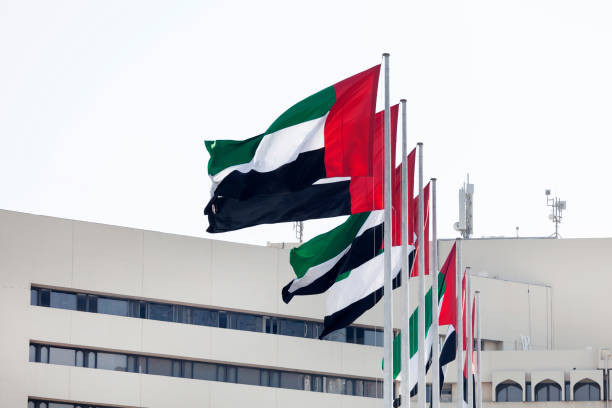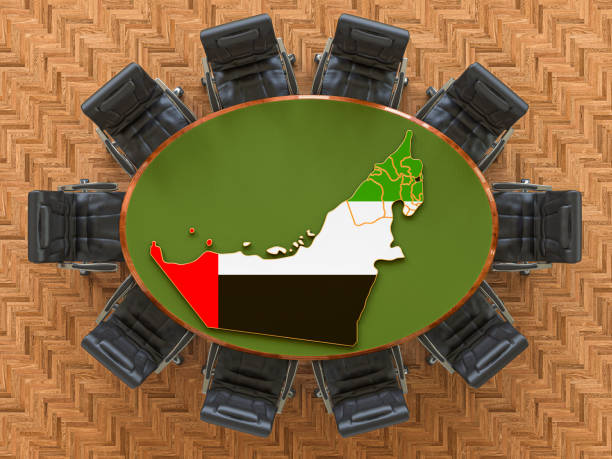For expatriates, the government and political system in UAE may initially appear quite distinct from what they are accustomed to in their home countries. Here, we aim to provide a comprehensive overview to help you navigate this unique political landscape.
The United Arab Emirates has undergone a significant transformation, evolving from a historically tumultuous political past into a nation that presents itself as progressive and tolerant. Nevertheless, there are ongoing debates and scrutiny surrounding the extent to which this self-presentation aligns with reality. As an expatriate, it’s essential to familiarize yourself with the political system in the UAE and recognize the differences in political freedoms compared to your home country.
This informative guide will cover the following topics:
Government and Political System
Government and Political System in UAE
The United Arab Emirates (UAE) emerged as a constitutional federation in 1971, rapidly ascending to become one of the world’s wealthiest federations due to its thriving oil exports. The UAE takes pride in portraying itself as a remarkably open and inclusive nation in the Gulf region, championing cultural diversity and freedom of belief. Nevertheless, this assertion remains a subject of intense debate.
Comprising seven emirates, each under the leadership of an Emir, the UAE grants these emirates significant autonomy in resource management. The seven emirates are as follows: Abu Dhabi, Dubai, Sharjah, Ras Al Khaimah, Ajman, Umm Al Quwain, and Fujairah.
Collectively, the seven Emirs constitute the Federal Supreme Council (FSC), responsible for selecting the UAE’s President and forming the cabinet. The FSC holds the highest authority in the UAE, wielding both legislative and executive powers.
Beneath the FSC is the Federal National Council (FNC), composed of 40 members serving four-year terms. Half of these FNC members are appointed by the President, while the other half are elected by the populace, with each emirate sending a specific number of representatives based on its size. The FNC holds the authority to approve or reject federal bills, scrutinize the Annual General Budget, and provide recommendations to the FSC.
With Dubai and Abu Dhabi as the most prominent emirates, they each command eight seats on the FNC. Sharjah and Ras al-Khaimah are allocated six seats, while Ajman, Umm al-Quwain, and Fujairah have four each.
The UAE’s political framework is underpinned by a constitution established in 1996, comprising 152 articles that encompass diverse aspects, from the objectives of enacting legislation to the rights of the nation’s citizens.
UAE President
The current head of the UAE government is President Mohamed bin Zayed bin Sultan Al Nahyan, who also serves as the Emir of Abu Dhabi, the largest oil-producing emirate in the UAE. President bin Zayed assumed office in 2022. Meanwhile, Mohammed bin Rashid Al Maktoum, the Emir of Dubai, holds the positions of Vice President and Prime Minister. President bin Zayed took the reins following the passing of his half-brother, Khalifa bin Zayed bin Sultan Al Nahyan, who had been in power since 2004.

Electoral System in UAE
The UAE’s electoral system is characterized by several unique features. Unlike many countries, the UAE doesn’t have political parties. However, there is an increasing level of political participation and citizen engagement.
The election of the President and Vice President takes place every five years, but only the Federal Supreme Council (FSC) members participate in this election. The general public does not have a direct say in this process.
On the other hand, citizens of the UAE do have the opportunity to vote for 20 out of the 40 members of the Federal National Council (FNC). This aspect of the political system has seen substantial growth in recent years. The UAE’s Electoral College has expanded significantly since granting citizens the right to vote for FNC members in 2006.
During the first election, fewer than 7,000 citizens participated in the voting process. However, by 2015, the number had increased to over 220,000, representing around a third of the adult citizen population. In the 2019 election, this number further rose to more than 330,000, highlighting the growing engagement of the citizens in the political process.
Like Government and Political System in UAE, You may also like to read about History of the UAE.
Voting in the United Arab Emirates
The election for members of the Federal National Council (FNC) takes place every four years, with the most recent election occurring on 5 October 2019. This election demonstrated a growing interest in the FNC, with a total of 555 candidates registering to run for office. Notably, 194 of these candidates submitted their applications within the first 24 hours, indicating a strong desire to participate. Out of the applicants, 200 were women. This surge in women’s participation follows a presidential decree mandating that women should constitute at least 40% of the council’s members, marking a substantial increase from the one-fifth of applications from women in 2015.
The electoral roll records revealed a remarkable 50% increase in the number of registered voters for the 2019 election. Notably, 61% of the 337,738 registered voters were under the age of 40, and slightly more than half (50.6%) were women. In terms of representation, Abu Dhabi had the largest number of registered voters, with 101,549, followed by Dubai, which had 60,772 registered voters.
Political History of the UAE
Much of the region’s political history is rooted in the discovery of oil in the 1950s and the subsequent formation of the UAE as a federation of states in 1971.
In the 1970s and 1980s, the UAE took significant steps, including the creation of the Federal National Council (FNC) in 1972 and its role as a founding member of the Gulf Cooperation Council (1981), led by Sheikh Zayed bin Sultan Al Nahyan.
The late 1980s and early 1990s brought challenges, including an attempted coup in Sharjah in 1987, the UAE’s participation in the Gulf War in 1991, and the collapse of the Bank of Credit and Commerce International (BCCI), of which Abu Dhabi’s ruling family owned a significant stake. During this period, the UAE also worked towards reconciliation with Iran.
In December 2006, under the leadership of Khalifa bin Zayed Al Nahyan, the UAE held its first-ever national elections for the Federal National Council (FNC). This marked the beginning of a development strategy aimed at establishing the federation as a global leader. Additionally, Dubai and Qatar made substantial investments in the London Stock Exchange during a period of financial prosperity.
However, the financial crash of 2008 brought this growth to a halt, with Dubai requiring substantial financial assistance from Abu Dhabi. In the subsequent years, various regional conflicts took the spotlight. The UAE faced international scrutiny regarding its approach to dissenting voices.

Judiciary System in the UAE
The judicial system in the UAE is established according to the UAE constitution, which incorporates a legal code based on Sharia law. In practice, this system operates by combining principles from both Islamic and Western legal traditions. The Federal Judiciary is responsible for overseeing the judicial system, while individual states appoint their Ministries of Justice.
The UAE’s judicial system is organized into three primary pillars. First, there are the federal supreme courts, which handle cases related to federal matters, disputes between emirates, and crimes against the state.
The second pillar consists of courts of first instance, which have jurisdiction over administrative, civil, and commercial disputes.
Lastly, local judicial bodies are responsible for addressing minor legal matters within each of the individual emirates.
Recent Political Reforms in the UAE
Recent political reforms in the UAE have aimed to modernize the political system, leading to increased citizen participation. One significant development was the establishment of the electoral college in 2006, which enhanced political engagement among citizens.
Efforts to promote transparency have also been made. In 2008, the Supreme Council laws were revised to require the Prime Minister, deputies, and federal ministers to abstain from other professional or commercial roles and business transactions.
Additionally, the UAE created the Soft Power Council and launched the Soft Power Strategy in 2017, focusing on enhancing the country’s international reputation and leveraging its rich heritage and culture on the global stage. The government expressed its intent to establish the UAE as a “modern and inclusive nation that embraces people from all around the world.”
Political Tensions in the UAE
Political tensions in the UAE have drawn criticism, as the government’s promotion of tolerance has been observed to have limitations. Negative political expression has faced strict suppression, with human rights activists imprisoned and some groups denied entry to the country.
Although the UAE enshrines the freedom to practice religious worship in its laws, this is closely monitored, particularly regarding the Muslim Brotherhood, which the government considers a terrorist group threatening its hereditary rule. The United States organization Freedom House rates the UAE with an overall freedom rating of just 17/100. Media censorship is another concern, with the UAE ranking poorly in the Worldwide Press Freedom Index by Reporters without Borders, placing 133rd out of 180 countries.
Foreign policy disputes have also emerged, including territorial conflicts with Iran and the UAE’s involvement in cutting ties with Qatar. Alongside several neighboring nations, notably Saudi Arabia, the UAE initiated a blockade against Qatar due to its support for the Muslim Brotherhood. This protest against Qatar included the expulsion of Qatari residents, the banning of the news agency Al Jazeera, and threats of jail terms for UAE residents sympathetic to Qatar. The blockade remains in effect.
Economic Landscape of the UAE
Prior to the UAE’s oil discovery in the 1950s, its economy relied on fishing and a diminishing pearl industry. Nevertheless, the commencement of oil exports in the early 1960s ushered in a substantial transformation of the country’s economic landscape. As per government reports, the key contributors to GDP include the oil and gas sector (30%), wholesale and retail trade (12%), financial services (9%), and construction (8%). The government’s objectives encompass economic diversification and leveraging global economic partnerships to enhance overall prosperity.
According to data from IHS Markit, the UAE’s economy registered a growth of 2.2% in the first quarter of 2019, underpinned by ongoing government investments outside of the oil sectors. Additionally, the Central Bank’s latest projection for economic growth in 2019 stands at 2%.
Dubai is gearing up to host Expo 2020, a global event that will span 173 days starting in October. This undertaking is expected to provide a substantial economic upswing to the Emirates.

